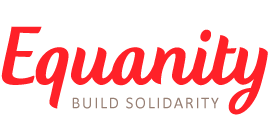

Equanity Build Solidarity

Île-de-France, France
November 2019
Other business support
Service with Minor Environmental Footprint
France
Equanity is a consulting firm for the development and financing of impact projects that mobilize private funds (sponsorship, philanthropy, investments) to deploy. The strategic elaboration and the operational implementation of partnerships between the actors of the general interest and the economic actors are at the heart of its missions. For eight years, Equanity has supported associations, companies, foundations and public institutions that, by placing the social, environmental and cultural impact at the heart of their strategy, contribute to the economy of tomorrow. Equanity est une société de conseil au service du développement et du financement de projets à impact qui mobilisent des fonds privés (mécénat, philanthropie, investissements) pour se déployer. L'élaboration stratégique et la mise en œuvre opérationnelle de partenariats entre les acteurs de l'intérêt général et les acteurs économiques sont au cœur de ses missions. Depuis huit ans, Equanity accompagne des associations, des entreprises, des fondations et des établissements publics qui, en plaçant l’impact social, environnemental et culturel au cœur de leur stratégie, contribuent à l'économie de demain.
Overall B Impact Score
Governance 17.3
Governance evaluates a company's overall mission, engagement around its social/environmental impact, ethics, and transparency. This section also evaluates the ability of a company to protect their mission and formally consider stakeholders in decision making through their corporate structure (e.g. benefit corporation) or corporate governing documents.
What is this? A company with an Impact Business Model is intentionally designed to create a specific positive outcome for one of its stakeholders - such as workers, community, environment, or customers.
Workers 28.9
Workers evaluates a company’s contributions to its employees’ financial security, health & safety, wellness, career development, and engagement & satisfaction. In addition, this section recognizes business models designed to benefit workers, such as companies that are at least 40% owned by non-executive employees and those that have workforce development programs to support individuals with barriers to employment.
Community 18.6
Community evaluates a company’s engagement with and impact on the communities in which it operates, hires from, and sources from. Topics include diversity, equity & inclusion, economic impact, civic engagement, charitable giving, and supply chain management. In addition, this section recognizes business models that are designed to address specific community-oriented problems, such as poverty alleviation through fair trade sourcing or distribution via microenterprises, producer cooperative models, locally focused economic development, and formal charitable giving commitments.
Environment 9.5
Environment evaluates a company’s overall environmental management practices as well as its impact on the air, climate, water, land, and biodiversity. This includes the direct impact of a company’s operations and, when applicable its supply chain and distribution channels. This section also recognizes companies with environmentally innovative production processes and those that sell products or services that have a positive environmental impact. Some examples might include products and services that create renewable energy, reduce consumption or waste, conserve land or wildlife, provide less toxic alternatives to the market, or educate people about environmental problems.
Customers 19.0
Customers evaluates a company’s stewardship of its customers through the quality of its products and services, ethical marketing, data privacy and security, and feedback channels. In addition, this section recognizes products or services that are designed to address a particular social problem for or through its customers, such as health or educational products, arts & media products, serving underserved customers/clients, and services that improve the social impact of other businesses or organizations.
What is this? A company with an Impact Business Model is intentionally designed to create a specific positive outcome for one of its stakeholders - such as workers, community, environment, or customers.